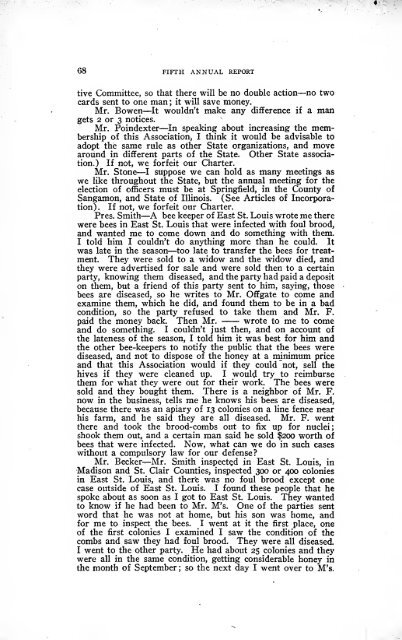Annual report of the Illinois State Bee-keepers ... - University Library
Annual report of the Illinois State Bee-keepers ... - University Library
Annual report of the Illinois State Bee-keepers ... - University Library
Create successful ePaper yourself
Turn your PDF publications into a flip-book with our unique Google optimized e-Paper software.
.iMi<br />
68 FIFTH ANNUAL REPORT<br />
tive Committee, so that <strong>the</strong>re will be no double action—^no two<br />
cards sent to one man ; it will save money.<br />
Mr. Bowen—It wouldn't make any difference if a man<br />
gets 2 or 3 notices.<br />
Mr. Poindexter—In<br />
speaking about increasing <strong>the</strong> membership<br />
<strong>of</strong> this Association, I think it would be advisable to<br />
adopt <strong>the</strong> same rule as o<strong>the</strong>r <strong>State</strong> organizations, and move<br />
around in different parts <strong>of</strong> <strong>the</strong> <strong>State</strong>. O<strong>the</strong>r <strong>State</strong> association.)<br />
If not, we forfeit our Charter.<br />
Mr. Stone—I suppose we can hold as many meetings as<br />
we like throughout <strong>the</strong> <strong>State</strong>, but <strong>the</strong> annual meeting for <strong>the</strong><br />
election <strong>of</strong> <strong>of</strong>ficers must be at Springfield, in <strong>the</strong> County <strong>of</strong><br />
Sangamon, and <strong>State</strong> <strong>of</strong> <strong>Illinois</strong>. (See Articles <strong>of</strong> Incorporation).<br />
If not, we forfeit our Charter.<br />
Pres. Smith—A bee keeper <strong>of</strong> East St. Louis wrote me <strong>the</strong>re<br />
were bees in East St. Louis that were infected with foul brood,<br />
and wanted me to come down and do something with <strong>the</strong>m.<br />
I told him I couldn't do an3^hing more than he could. It<br />
was late in <strong>the</strong> season—too late to transfer <strong>the</strong> bees for treatment.<br />
They were sold to a widow and <strong>the</strong> widow died, and<br />
<strong>the</strong>y were advertised for sale and were sold <strong>the</strong>n to a certain<br />
party, knowing <strong>the</strong>m diseased, and <strong>the</strong> party had paid a deposit<br />
on <strong>the</strong>m, but a friend <strong>of</strong> this party sent to him, saying, those<br />
bees are diseased, so he writes to Mr. Offgate to come and<br />
examine <strong>the</strong>m, which he did, and found <strong>the</strong>m to be in a bad<br />
condition, so <strong>the</strong> party refused to take <strong>the</strong>m and Mr. F.<br />
paid <strong>the</strong> money back. Then Mr. wrote to me to come<br />
and do something. I couldn't just <strong>the</strong>n, and on account <strong>of</strong><br />
<strong>the</strong> lateness <strong>of</strong> <strong>the</strong> season, I told him it was best for him and<br />
<strong>the</strong> o<strong>the</strong>r bee-<strong>keepers</strong> to notify <strong>the</strong> public that <strong>the</strong> bees were<br />
diseased, and not to dispose <strong>of</strong> <strong>the</strong> honey at a minimum price<br />
and that this Association would if <strong>the</strong>y could not, sell <strong>the</strong><br />
hives if <strong>the</strong>y were cleaned up. I would try to reimburse<br />
<strong>the</strong>m for what <strong>the</strong>y were out for <strong>the</strong>ir work. The bees were<br />
sold and <strong>the</strong>y bought <strong>the</strong>m. There is a neighbor <strong>of</strong> Mr. F.<br />
now in <strong>the</strong> business, tells me he knows his bees are diseased,<br />
because <strong>the</strong>re was an apiary <strong>of</strong> 13 colonies on a line fence near<br />
his farm, and he said <strong>the</strong>y are all diseased. Mr. F. went<br />
<strong>the</strong>re and took <strong>the</strong> brood-combs out to fix up for nuclei;<br />
shook <strong>the</strong>m out, and a certain man said he sold $200 worth <strong>of</strong><br />
bees that were infected. Now, what can we do in such cases<br />
without a compulsory law for our defense?<br />
Mr. Becker^Mr. Smith inspected in East St. Louis, in<br />
•Madison and St. Clair Counties, inspected 300 or 400 colonies<br />
in East St. Louis, and <strong>the</strong>re was no foul brood except one<br />
case outside <strong>of</strong> East St. Louis. I found <strong>the</strong>se people that he<br />
spoke about as soon as I got to East St. Louis. They iVanted<br />
to know if he had been to Mr. M's. One <strong>of</strong> <strong>the</strong> parties sent<br />
word that he was not at home, but his son was home, and<br />
for me to inspect <strong>the</strong> bees. I went at it <strong>the</strong> first place, one<br />
<strong>of</strong> <strong>the</strong> first colonies I examined I saw <strong>the</strong> condition <strong>of</strong> <strong>the</strong><br />
combs and saw <strong>the</strong>y had foul brood. They were all diseased.<br />
I went to <strong>the</strong> o<strong>the</strong>r party. He had about 25 colonies and <strong>the</strong>y<br />
were all in <strong>the</strong> same condition, getting considerable honey in<br />
<strong>the</strong> month <strong>of</strong> September; so <strong>the</strong> next day I went over to M's.









![Novellen [microform] - University Library](https://img.yumpu.com/21939450/1/171x260/novellen-microform-university-library.jpg?quality=85)
![Anecdota Chisiana de re metrica [microform]](https://img.yumpu.com/21939448/1/190x239/anecdota-chisiana-de-re-metrica-microform.jpg?quality=85)



![Schollenbruch [microform] : Gedichte - University Library](https://img.yumpu.com/21939437/1/174x260/schollenbruch-microform-gedichte-university-library.jpg?quality=85)

